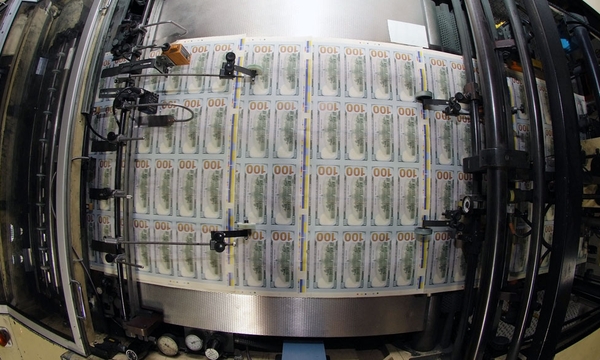Government Counterfeiting Squeezes Families, Not Capitalism
It’s all capitalisms fault!
What is?
Well, everything.
At least that’s the narrative you get from the political left, and quite frankly, not infrequently from the political right.
Case in point – a book released a couple of months ago by Alissa Quart called Squeezed: Why Our Families Can’t Afford America.
Of course, the reason is capitalism.
Quart serves as the executive editor of the Economic Hardship Reporting Project. Her book “examines the lives of many middle-class Americans who can now barely afford to raise children.” Her subjects “have been wrung out by a system that doesn’t support them, and enriches only a tiny elite.”
In a sense, she’s not wrong. The system is designed to enrich the elite at the expense of everybody else. Every year, the Federal Reserve and the US government devalue our currency by essentially counterfeiting money. They print fiat currency out of thin air. This monetary inflation erodes our purchasing power and lowers our standard of living.
Inflation is civilization’s death spiral. As Peter Schiff pointed out in a recent podcast, the average wage rate has gone up 2.7% in the last year. Meanwhile, the Consumer Price Index (CPI) has increased by 2.9% during the same period. The CPI almost certainly understates the cost of living, but even if you take that number at face value, it’s clear Americans are losing ground.
But no mention of this from Quart. Nope. It’s not money printing and quantitative easing and government debt that are robbing the middle class. It’s capitalism itself. Economist Doug French summarizes Quart’s book in a recent post on the Mises Wire.
Quart claims members of the middle class are happy idiots, encouraged to do what they love, while being pummeled by capitalism, no union protections, and a frayed social safety net. The hyper-educated poor are hidden she writes. ‘The number of people with graduate degrees receiving food assistance or other forms of federal aid nearly tripled between 2007 and 2010 and those with a Ph.D. who received assistance rose from 9,776 to 33,655.’
Quart spends considerable time complaining about the pittance adjunct college professors are paid. Having done adjunct duty myself, I know how little it pays. I also know I was happy to get the work and loved every minute of it.
Universities can’t pay for all of those useless administrators if adjuncts aren’t willing to teach for a couple grand a class. As of 2011, the author writes that only one professor in six is tenured. Back in 1975, about half were full-time.
Quart frets that Union membership is down to 11 percent from 30 percent in the 1960s and in the private sector only 7 percent are union members. She also points out, ‘the number of part-timers working just below thirty hours a week rose from 2013 to 2015.’ but neglects to point out the reason, the Affordable Care Act.
Predictably, Quart’s solutions to the problem are a hodgepodge of leftist government interventions.
The author has a knack for statements that jump off the page and make anyone’s blood boil who even marginally believes in freedom. In a section about multiple couples sharing parenting duties, she writes, ‘Why haven’t state-based or federal policy fixes been implemented that would free us from our exhausting and often unsustainable independence?’
She constantly derides individual ingenuity believing the nanny state should solve everyone’s problems. The way Quart puts it is, “we substitute market transactions for what should be human interactions.”
While minimum wage laws and work regulations push employers toward automation and robotics, Quart writes, ‘why shouldn’t we be Luddites?’ and ‘shouldn’t we be concocting legislation to help all strata of workers who will be displaced by our mechanical friends?’ There are 140 hospitals now employing 500 robots. ‘The medication delivery robots are programmed to require only a biometric access and pin code from a human to finalize the meds’ deliveries.’ Remembering my extended time in the hospital a robot would have been an improvement over some of the surly RNs I encountered.
The author is even worried about attorneys. Some lawyers shouldering $200,000 in student loan debt have been relegated to being ‘Doc monkeys’ who earn only $17 to $20 an hour.
Second jobs driving for Uber and the like are required for teachers and others to afford housing in expensive cities like San Francisco. Quart makes no mention of the real reason for home price and rent increases; the aforementioned Fed money creation, as well as local government restrictions on the creation of new housing supply. Instead, she claims, ‘Rent stabilization and control go along with better-regulated real estate development overall, especially in desirable cities.’
All of this misses the point. It’s Fed monetary policy and all of the government interventions it facilitates that has squeezed Americans not “too much capitalism.” The value of the dollar has fallen some 95% since the creation of the Fed in 1913.
It’s true that the economy is stacked against the little guy. It’s also true that the elite profit from the system. But it’s not the business owners and the entrepreneurs who are screwing you over. It’s the central bankers and government officials who control the monetary system. That’s where Quart should direct her wrath.
In his book A Case Against the Fed, economist Murray Rothbard wrote:
Monetary inflation, then, acts as a hidden ‘tax’ by which the early receivers expropriate (i.e., gain at the expense of) the late receivers. And of course since the very earliest receiver of the new money is the counterfeiter, the counterfeiter’s gain is the greatest. This tax is particularly insidious because it is hidden, because few people understand the processes of money and banking, and because it is all too easy to blame the rising prices, or ‘price inflation’ caused by the monetary inflation on greedy capitalists, speculators, wild-spending consumers, or whatever social group is the easiest to denigrate. Obviously, too, it is to the interest of the counterfeiters to distract attention from their own crucial role by denouncing any and all other groups and institutions as responsible for the price inflation.”
Sadly, people like Quart want more of this.
Get Peter Schiff’s most important Gold headlines once per week – click here – for a free subscription to his exclusive weekly email updates.
Interested in learning how to buy gold and buy silver?
Call 1-888-GOLD-160 and speak with a Precious Metals Specialist today!





 Since Nayib Bukele became president of El Salvador, El Salvador has been in American media and global political discussion more than ever. While much of the attention focuses on Bukele’s mass incarceration of gang members and a decline in homicide of over 70%, Bukele has also drawn attention to his favoritism towards Bitcoin and how he […]
Since Nayib Bukele became president of El Salvador, El Salvador has been in American media and global political discussion more than ever. While much of the attention focuses on Bukele’s mass incarceration of gang members and a decline in homicide of over 70%, Bukele has also drawn attention to his favoritism towards Bitcoin and how he […] With gold hitting yet another awe-inspiring all-time high in the wake of Powell’s remarks reassuring markets (more or less) to expect rate cuts in 2024, a few analysts are pointing out risk factors for a correction — so is there really still room to run?
With gold hitting yet another awe-inspiring all-time high in the wake of Powell’s remarks reassuring markets (more or less) to expect rate cuts in 2024, a few analysts are pointing out risk factors for a correction — so is there really still room to run? Gold hit a new all-time nominal high, surpassing the previous record set in December of the previous year. The precious metal’s price reached approximately $2,140, indicating a robust and continuing interest in gold as a safe-haven asset, despite a rather peculiar lack of fanfare from the media and retail investors. This latest peak in gold […]
Gold hit a new all-time nominal high, surpassing the previous record set in December of the previous year. The precious metal’s price reached approximately $2,140, indicating a robust and continuing interest in gold as a safe-haven asset, despite a rather peculiar lack of fanfare from the media and retail investors. This latest peak in gold […] The gold price has been surging, with unprecedented central bank demand gobbling up supply. It has been a force to behold — especially as US monetary policy has been relatively tight since 2022, and 10-year Treasury yields have rocketed up, which generally puts firm downward pressure on gold against USD.
The gold price has been surging, with unprecedented central bank demand gobbling up supply. It has been a force to behold — especially as US monetary policy has been relatively tight since 2022, and 10-year Treasury yields have rocketed up, which generally puts firm downward pressure on gold against USD.  Total gold demand hit an all-time high in 2023, according to a recent report released by the World Gold Council. Last week, the World Gold Council (WGC) released its Gold Demand Trends report, which tracks developments in the demand for and use of gold around the world. Excluding over-the-counter (OTC) trade, 2023 gold demand fell slightly from 2022 […]
Total gold demand hit an all-time high in 2023, according to a recent report released by the World Gold Council. Last week, the World Gold Council (WGC) released its Gold Demand Trends report, which tracks developments in the demand for and use of gold around the world. Excluding over-the-counter (OTC) trade, 2023 gold demand fell slightly from 2022 […]